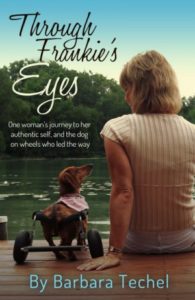A Dachshund in a wheelchair on the book cover grabbed at my heart. About fifteen years ago, I too had owned a dog that needed a wheel chair due to osteosarcoma, a fast-growing bone cancer.
Was the author’s experience similar to mine? How did she deal with the constraints of a wheel chair? I had to find out.
This post contains affiliate links. If you click on one and make a purchase, even on a different item, then I will earn a small compensation.
 Frankie’s paralysis occurred due to a fall while Barbara Techel was on vacation, and complications caused from IVDD (Intervertebral Disk Disease). Obviously, Techel’s experience with Frankie affected her enough to write several books including two were children’s books and this memoir. I had to read it. My springer, Kaylee, had also influenced my writing of our story.
Frankie’s paralysis occurred due to a fall while Barbara Techel was on vacation, and complications caused from IVDD (Intervertebral Disk Disease). Obviously, Techel’s experience with Frankie affected her enough to write several books including two were children’s books and this memoir. I had to read it. My springer, Kaylee, had also influenced my writing of our story.
Although Through Frankie’s Eyes http://www.amazon.com/Through-Frankies-Eyes-Journey-Authentic/dp/0980005299 is more about the author, Barbara Techel, than about Frankie. I found it compelling how this dog gave her a career change and helped her find her life’s purpose. Preliminary reviews of my yet to be completed book brought up questions asking, what had I learned from Kaylee and from my experience with her? My mind always drew a blank. I had spent so much time caring for her and earning money for her treatments, I hadn’t thought about much else.
However, a paralyzed dog does teach you.
- The dog accepts their condition and usually doesn’t get depressed (although the owner might).
- They test your dedication to their needs since often they do not have full bowel or bladder control and need help getting around when they can no longer follow your every move.
- You become a local expert on their condition and try to connect with others with similar situations. Techel did this through Dodgerslist, a group that provided much information and support for IVDD in dogs http://www.dodgerslist.com/. Unfortunately, this group did not exist when Kaylee was paralyzed.
For Techel, her experience went way beyond these lessons as she reached out to teach children not to judge other people based on their physical appearance, and to accept life’s challenges. The old cliché ‘When life gives you a lemon, make lemonade’ definitely applies to both Techel and Frankie.
My experiences with dogs were amazingly similar to Techel’s at some points. She also had a dog with osteosarcoma this was not Frankie but her first dog, Cassie, , to whom she devoted a good portion of the first fifty pages of the book. Cassie suffered much less trauma with osteosarcoma than my Kaylee did, but having gone through the experience of losing a healthy dog to this cancer makes us kindred spirits. In addition, the dog’s name, Cassie, was the name of my second springer spaniel, who died about a year ago from a brain tumor.
I recommend this book to dog owners, those who love to read memoirs, and people seeking inspiration. Techel’s experience is even making me consider training one of my current dogs, a cocker named Buffy, to be a therapy dog—if she can stop wiggling long enough to listen.


Loved this book review ,Sandy-plan to read the book.